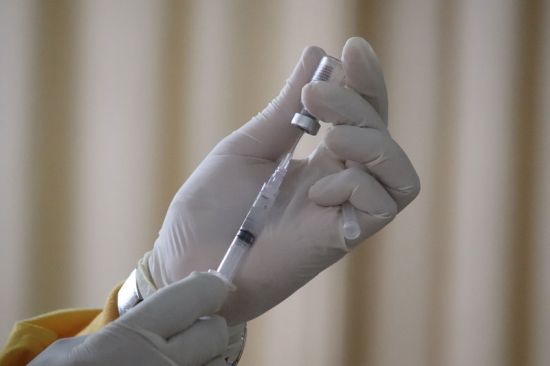HPV vaccinations crucial for people living with HIV
14 MARCH 2023 | STORY NIÉMAH DAVIDS. PHOTO UNSPLASH.

Mark D. Hicar, MD, PhD, is using an IDSA Foundation grant to explore a potential link between infectious diseases and Alzheimer’s disease.
Implementing a national public health policy that requires that all people living with HIV be vaccinated against the human papilloma virus (HPV) as soon as their HIV diagnosis has been confirmed is necessary to reduce the high HPV incidence rate in South Africa, said the University of Cape Town’s (UCT) Professor Anna-Lise Williamson.
Professor Williamson is a world-renowned HPV researcher based in the Division of Virology in the Department of Pathology in UCT’s Faculty of Health Sciences. She also holds the South African National Research Chair’s Initiative (SARChI) in Vaccinology. Williamson delivered the keynote address during a belated HPV Awareness Day seminar held on Thursday, 9 March. International HPV Awareness Day is observed annually on 4 March. The hybrid event was hosted by Professor Lynette Denny, the director of UCT’s Gynaecological Cancer Research Centre (GCRC) and the seminar speaker line-up included scholars at the forefront of the fight against HPV locally and globally.
“I think we should have a policy in the country that when someone is diagnosed with HIV, they should be vaccinated [against HPV] immediately.”
“There is no doubt that people living with HIV should receive an HPV vaccine. I think we should have a policy in the country that when someone is diagnosed with HIV, they should be vaccinated [against HPV] immediately. We should lobby [for it],” Williamson said.
HPV under the microscope
HPV is a common viral infection of the reproductive tract and is spread through skin-to-skin contact. There are more than 100 different types of HPV and the virus infects the genitals, the mouth and throat. While most HPV infections clear on their own, there is a risk that the infection may become persistent and lead to pre-cancerous lesions in the affected area. These precancerous lesions may progress and develop into invasive cervical cancer, as well as penile and anal cancer.
According to the World Health Organization (WHO), cervical cancer specifically is the fourth most common cancer globally, and in 2020 claimed the lives of approximately 350 000 women. More than 80% of cases occur in low- to middle-income countries in sub-Saharan Africa, Asia, Melanesia and Southeast Asia. In South Africa alone, more than 10 000 new cases of cervical cancer are diagnosed every year, with approximately 5 000 deaths.
Two public health emergencies
Williamson said that HIV and cervical cancer are both major public health emergencies in Africa. And research indicates that the burden of cervical cancer is felt by people who already experience health disparities like women and girls living in marginalised communities with poor access to healthcare.
Alarmingly, women living with HIV also have a much higher risk of developing cervical cancer when compared to HIV-negative women.
“With [women living with] HIV, there’s an increased risk of developing pre-cancerous lesions and an increased risk of developing cervical cancer. HIV-positive women with cervical cancer also have a poorer prognosis,” Williamson said. “Antiretroviral therapy helps [women with HIV and HPV], but it doesn’t get these women back [to where] HIV-negative women [with HPV are]. And so even though [HIV-positive women] will have a reconstituted immune system, they are still at high risk.”
She said results from a recent research study that aimed to quantify the prevalence of HPV in several couples in Cape Town found that 77% of participating HIV-positive men tested positive for HPV and 49% of participating HIV-negative men also tested positive for HPV. Similarly, 74% of HIV-positive women and 36% of HIV-negative women also tested positive for HPV respectively.
Vaccinate people living with HIV
Williamson told the audience that undoubtedly people living with HIV must receive the HPV vaccine. And while discussions around its feasibility have gained momentum among health experts and policy makers globally; a few key questions remain. These, she explained, include the recommended number of HPV vaccine doses per individual; whether the current 9-valent HPV vaccine will prevent more disease and if vaccine boosters are needed long-term. And for girls who are HIV negative when vaccinated, what happens when they become HIV positive?
“We have a need for novel vaccines that target more than just HPV 16 and 18.”
As scientists work tirelessly to eradicate HPV and cervical cancer, Williamson said there’s a need for a group-specific HPV vaccine and not just one that targets HPV types 16 and 18.
“We have a need for novel vaccines that target more than just HPV 16 and 18. And if possible, to expand the population [of HPV vaccine recipients] to accelerate the eradication of cervical cancer. I think we should make the effort to make it happen faster rather than just sit and wait.”
Source: https://www.news.uct.ac.za/article/-2023-03-14-hpv-vaccinations-crucial-for-people-living-with-hiv
For more HIV and AIDS News visit...
Positively Positive - Living with HIV/AIDS:
HIV/AIDS News |